031.1 বড় বাক্য তৈরি করার উপায়/পদ্ধতি(Expand Sentence Structure)
ইংরেজি বড় বাক্য করার নিয়ম:-
Sub + Verb + Obj1(কাকে?) + O2(কি?) + D1 (কোথায় থেকে?) + D2 (কোন দিকে?) + M1(কিভাবে?) + M2(কার সাথে?) + P(কোথায়?) + T(কখন?) + R(কেন?)
উদাহরণ-
We select him Captain among the students of our class by voting with the help of senior teachers of our faculty at the place of our department on the first day/date in march for the purpose of taking care of the work of class.
ইংরেজি বড় বাক্য হয় দুইভাবে। যথা:-
• Prepositional Phrase (Preposition+noun)
• Clauses/ Phrases (reduce system)
বি:দ্র: noun কে ‘কিভাবে’ দ্বারা প্রশ্ন করে adj আনা যাবে, আবার adj কে ‘কেমন’ দ্বারা প্রশ্ন করলে adverb আনা যাবে.
যেমন- I saw a very beautiful girl.
কিছু Prepositional Phrases:-
For – জন্যে/ উদ্দ্যেশ্যে/ কারণে
For the purpose of
for the sake of
with an eye to
on the account of
look forward to
in order to+V
By(means/way/virtue/didn’t) of
Because of
thanks to
due to/ owing to
preparatory t
on the eve of
on the cause of
# কিছু Prepositional phrase যুক্ত বাক্যের স্টাইল:-
1) News of the shooking attack on Pearl Harbor galvanized the nation in action.
2) The accelerated growth of public employment parallels the dramatic expansion of budgets and programs.
3) Rent control restrictions on an apartment owners may unfortunately exacerbate rathan than alleviate housing problems.
# ছোট বাক্যকে বড় করার নিয়ম:- English লেখাকে বড় ও জটিল করার elements:
• Prepositional Phrase ব্যবহার করা।
• বাক্যকে passive voice এ রাখা।
• Present perfect/continues এ রাখা।
• Clause এর মারপ্যাঁচ দেওয়া। যেমন- adj clause, noun clause, adverbial clause এর সংমিশ্রণে রাখা।
• বাক্যে ঘন ঘন adverb ব্যবহার করা।
• Grammar এর সচরাচর রুলস এর বাইরে গিয়ে কঠিন রুলস প্রয়োগ করা।
• Gre, gmat, sat এইসব বই থেকে ১০০-১৫০টি বড় বাক্যের স্টাইল শিখে নেওয়া।
• ইংরেজি বাক্যে মামানসই vocabulary ব্যবহার করা।
• reduce system এপ্লাই করা।
clause, phrase, inversion, causitive verb, present/past participle, starting prepositional phrase ইত্যাদি ব্যবহার করা।
# kinds of clause: পুর্বের নোট দেখ।
Clause: যার একটি Sub ও একটি main verb আছে, তবে বাক্যের একটা অংশ হিসেবে ব্যবহৃত হয়, তাকে clause বলে।
বিঃদ্রঃ অনেকে clause এর সাথে sentence গুলিয়ে ফেলেন। বুঝার সুবিধার্থে এর উদাহরণ-
Kuddus loves Shabana but she loves Abul and he also love her. (এখানে, ১টি fullstop, তাই এটি ১টি বাক্য। কিন্তু তিনটি sub ও verb রয়েছে, তাই তিনটি clause রয়েছে।)
Clause তিন প্রকার:
1) Principal Clause/independent clause,
2) Sub-ordinate clause/ dependent clause(noun clause, adjective clause, adverb clause),
3) Co-ordinate clause.
Principal Clause: যে Clause অর্থ প্রকাশের জন্য অন্য clause এর উপর নির্ভরশীল নয়, তাকে Principal Clause বলে।
Sub-ordinate clause: যে Clause অর্থ প্রকাশের জন্য অন্য clause তথা Principal Clause এর উপর নির্ভরশীল, তাকে Sub-ordinate Clause বলে।
এটি তিন প্রকার।
- ১) noun clause
- ২) adjective clause
- ৩) adverbial clause
# adjective clause:
সংজ্ঞা: যে clause noun/noun phrase কে (modification/অতিরিক্ত তথ্য দেয়) লক্ষ করে আসে অর্থাৎ noun এর পক্ষে কোন তথ্য দেওয়ার জন্য যে clause ব্যবহৃত হয় তাকে, Adj clause বলে।
মনে রাখা জরুরি- * adj + noun + adj clause
যেমন-
i saw a girl.
= I saw a beautiful girl who is a student of BBA in CU which is one of the most aesthetic institution in the subcontinent.
* who + verb (ব্যক্তির জন্য)
whose + noun (ব্যক্তির জন্য)
whom + sun + verb (ব্যক্তির জন্য)
that/which (বস্তুর জন্য)
যেমন-
The boy is my brother.
= The boy, who came here yesterday is my brother.
I love a girl.
= I love a girl whose name is Radika.
The girl was my girlfriend.
= The girl whom I love was my girlfriend.
# noun clause:
যেসব জায়গায় noun বসে ঠিক সেসব জায়গায় যদি কোন clause ব্যবহৃত হয়, তাকে noun clause বলে। সাধারণত noun চার জায়গায় বসে-
- ১)Sub হিসেবে, যেমন- who has done is totally wrong.
- ২) Obj হিসেবে, যেমন- I know where he lives.
- ৩) Complement হিসেবে, যেমন- that is what he did.
- ৪) After preposition, যেমন- I can’t understand the meaning of what he said.
# adverbial clause:
কিভাবে, কখন, কোথায়, কেন, ইত্যাদি প্রশ্নের উত্তরকে adverb বলে। আর, adverb এর জায়গায় যদি কোন clause বসে/ব্যবহৃত হয়, তাহলে তাকে adverbial clause বলা হয়।
যেমন- I go there. = I go where you want to go with your all of family member by bus in the morning at 9 AM. (এখানে, there এর জায়গায় clause আনা হয়েছে। there হল adverbial, আর এইটার পরিবর্তে যা বসেছে তা হল adverbial clause।)
# Co-ordinate clause:
Co-ordinate clause = compound sentence
*** Mixed technique(All clauses together) =
Although you disrespect me,I respect you whom I love from
the bottom of my heart as possible as I can so that I really feel myself very honest be on the cause of helping you by din’t of providing notes thnough my younger sister for your upcoming
examination with a vièw to improving yourself by practising mentioned these and I hope that you will get expected marks what you wants, It’s containt true that I had better be happy while watching you on a happily moode.
বিশেষ দ্রষ্টব্যঃ মনে রাখবে,
- Co-ordinate clause = compound sentence
# ছোট বাক্যকে বড় করার উদাহরণ-
মূল লক্ষ্যঃ Sabbir teaches the students English.
বড় করা বাক্য= Sabbir, who is one of the most famous teacher not only for Chattogram but also all over the country, teaches English to the students those who are the the students of Englich department in Chattagang University.
Because শব্দটি ব্যবহার Answer কে Extend করুন-
Question: Did you enjoy participating in team sports during your school years?
Answer: Yes, I thoroughly enjoyed participating in team sports like soccer and cricket because they provided a sense of friendship and taught me valuable teamwork skills. (হ্যাঁ, আমি ফুটবল এবং ক্রিকেটের মতো দলগত খেলায় অংশ নেওয়ার জন্য পুরোপুরি উপভোগ করেছি কারণ তারা বন্ধুত্বের অনুভূতি দিয়েছিল এবং আমাকে মূল্যবান টিমওয়ার্ক দক্ষতা শিখিয়েছিল।)
Question: Do you prefer studying alone or in groups?
Answer: Yes, I prefer studying in groups because it allows for collaborative learning, sharing of ideas, and helps me gain different perspectives on the subject matter. (হ্যাঁ, আমি দলগত অধ্যয়ন করতে পছন্দ করি কারণ এটি সহযোগিতামূলক শিক্ষার সুযোগ দেয়, ধারণাগুলি ভাগ করার সুযোগ দেয় এবং আমাকে বিষয়বস্তুতে বিভিন্ন দৃষ্টিভঙ্গি অর্জন করতে সহায়তা করে।)
# কঠিন থেকে কঠিনতর করার নিয়ম:-
কঠিন থেকে কাঠিন্য করার সহজ পদ্ধতি হলো clause কে reduce system ব্যবহার করে ছোট করে ফেলা তথা phrase ব্যবহার করে।
(((Phrase: বাক্যে sub ও verb থাকে না, তবে part of speech এর অংশ থেকে কিছু শব্দগুচ্ছ দিয়ে ভাব প্রকাশ করা হয়, তাকে phrase বলে।)))
উদাহরণ-
Active এ থাকলে–
মূল বাক্যঃ Sakib is my brother. He plays cricket in the field.
clause ব্যবহার করেঃ Sakib is my brother who plays cricket in the field.
phrase ব্যবহার করেঃ Sakib, who playing cricket, is my brother.
(এখানে, playing কেন হল? সূত্র মনে রাখবে-
বাক্য Active এ থাকলে তখন W.H + A.V তুলে দিয়ে main verb করতে হবে)
আর, passive হলে main P.P এ থেকে যাবে। যেমন-
মূল বাক্যঃ
1. Sheikh Mujeeb Rahman whs the best leader.
2. He was given ‘Banga Bandhu’.
clause ব্যবহার করেঃ Sheikh Mujeeb Rahman was the best leader who was given ‘Banga Bandhu’.
phrase ব্যবহার করেঃ Sheikh Mujeeb Rahman was the best leader given ‘Banga Bandhu’ .
বা,
Sheikh Mujeeb Rahman, given ‘Banga Bandhu’, was the best leader.)
###
Appositive:
ইংরেজি বাক্যে অতিরিক্ত তথ্য দিতে adj clause reduce করে appositive করা যায়। এতে বাক্যের সৌন্দর্য বৃদ্ধি পায়।
Rule 1: Sub, Appositive,…..
যেমন-
মুল বাক্য: Akbar who was an emperor of Delhi was a great ruler.
= Akbar, emperor of Delhi, was a great ruler.
Rule 2:: Obj, Appositive,…..
যেমন-
উদাহরণ ১- Khabsa asthar was born in Lahore, the capital of Punjab. (এখানে, Lahore এর সম্পর্কে extra information টাই Appositive)
উদাহরণ ২- The BTRC will purchase an orbital solt on 119 degree east from intersputonic, a renowned Russian company.
Rule 3:: Appositive,+Sub+…..ext
উদাহরণ ১- Ispahany is an outspoken orator and good student. He lives in CTG.
= An outspoken orator and good student, Ispahany, lives in CTG.
Rule extra: গুরুত্বপূর্ণ noun/pronoun এর Appositive:
The fact is clear to all.
= The fact that he is a theif is clear to all. (noun clause এর ব্যবহার)
###
adverbial clause কে reduce করার নিয়ম:
As Nursad entered the house, she heard a familiar voice in the living room.
আমরা জানি, complex sentence কে compound ও simple sentence এ রুপান্তর করা যায়। তবে, simple sentenceএ রুপান্তর করাটা বেশ effective.
আর, simple sentence এ finite verb একটা থাকে। অন্যান্য verb কে infinite করতে হয়।
সংক্ষিপ্ত করলে বাক্যটি:-
Entering the house, Nursad…..
আরও স্টাইলিশ করা যায়। Sub কে আগে এনে দেওয়া যায়।
Nursad, entering the house, heard a familiar voice in the living room.
অনুবাদ: (আগে Sub+p.p+Principle clause)
নুরসাদ ঘরে প্রবেশ করে লিভিং রুমে পরিচিত কন্ঠ শুনতে পেল।
#Sub একই হলে Perfect Perticiple Use করা যায়। যেমন-
After I had heard the thunder, I decided not to step outside.
= I having// Having heard the thunder, I decided not to step outside.
= I after having…..
# Inversion of word order:
structure: adverb1,2,3 + auxiliary verb + Sub + Verb + extension.
যেমন- No sooner had I gone there then the theif ran away.
উদাহরণ ১:-
Simple sentence: I have never seen such a thing before.
Inversion of word order করলে হয়:
= Never before I have seen such a thing.
= Never have I seen a thing before.
উদাহরণ ২:-
Simple sentence: I hadn’t understood it until yesterday.
Inversion of word order করলে হয়:
= Not until yesterday had I not understood it.
= Not had I understood it until yesterday.
Simple Sentence থেকে Complex Sentence তৈরি / বাক্য বড় করা হয় যেভাবে
A campervan, also referred to as a camper, caravanette, motorhome or RV (recreational vehicle) in North America, is a self-propelled vehicle that provides both transport and sleeping accommodation.
###
Simple–Complex– Compound
Simple: He works hard to succeed.
(সফল হতে সে কঠোর পরিশ্রম করে)
Complex : He works hard so that/in order that/that he may/can succeed. (সে কঠোর পরিশ্রম করে যাতে সে সফল হতে পারে)
Compound: He desires/wishes/wants to succeed, therefore he works hard.
(সে সফল হতে চায়, সেজন্য সে কঠোর পরিশ্রম করে)
Or, He works hard and he wants to succeed.
…….
মিথ্যা- counterfeit, spurious, untrue
আশাবাদী – Optimistic, hopeful, expectant
বিশ্বস্ত – Faithful, devoted, trustworthy, loyal
দ্রুত – swift,
গুরুত্বপূর্ণ- momentous, exigent
বিশেষ – exceptional, exclusive
প্রচুর – Adequate, Plenty, exuberance
# Some adverbs & Connectors::-
Distinctly – স্পষ্টভাবে
Elaborately – বিস্তরভাবে
vehemently – প্রচন্ডভাবে
Enthusiastically – উৎসাহের সহিত
Chronologically – ধারাবাহিকভাবে
Throughly – সম্পূর্ণভাবে
In sharply contrast to – বিপরীতক্রমে
A part from it/this বা furthermore – তাছাড়া
As a consequence – ফলে
to cite an example/ as an illustration – উদাহরণস্বরুপ
as to begin with / first and foremost – শুরুতে
in the one hand – একদিকে,
nevertheless/ not with standing -তা সত্ত্বেও।
Can এর সম্পূর্ণ ব্যবহার:-
(১) can = verb+তে পার/পারে/পারেন/পারিস(যোগ্যতা ও অনুমতি)
যেমন- He can go toilet – সে টয়লেটে যেতে পারে।
I can speak English. – আমি ইংরেজি বলতে পারি।
People can hardly manage time for reading.। – মানুষ পড়ার জন্য সময় বের করতে পারে না বললেই চলে।
(২) can be + (v+ing), (Verb+তে পারছি/ছে/ছ)
আমি ইংরেজি লিখতে পারছি – I can be writing English.
আমি তোমার সাহায্যের জন্য চাকরিটা করতে পারছি = I can be doing the job for your Help.
(৩) can be + (v.pp), (করা যায়/ যাবে)
কাজটি করা যায় – the work can be done.
সেখানে যাওয়া যায় – there can be gone.
(৪)Can be + noun/adj, (হতে পারে/ থাকতে পারে)
He can be a doctor. It can be costly.
(৫) can have + noun, (থাকতে পারে)
Sabbir can have many videos in YouTube.
Chandra can have a house in CTG.
(৬) can have + v.pp, (v+এ থাকতে পারে/পারি)
রতন বইটি পড়ে থাকতে পারে = Ratan can have read this book.
তোমরা চৌধুরী এবং হুসাইনের নাম শুনে থাকতে পারো। = You can have heard C&H.
(7) can have been + obj (হয়ে থাকতে পারে)
Nishat can have been his wife.
(৮) can have been + v.pp (যেতে পারে)
The man can have been cheated.
The book can have been read.
(৯) can have been + (v+ing), (v+তে থাকতে পারে)
He can have been reading for two days. = সে দুইদিন যাবত (পড়াশোনা করে) পড়তে থাকতে পারে।
(১০) cannot but + v1 / can’t help + (v+ing)
He can’t bark smoke..
How to expand sentence (৬টি উপায়ে)
একটা normal sentence(S+V) থেকে যেভাবে sentence expand করা যায়(৬টি উপায়ে):
টেকনিক:(নিচের লাইন দুটি মুখস্থ কর)
• যার সম্পর্কে অতিরিক্ত কথা, অতিরিক্ত কথাটা তার আগে/পরে(পাশে) বসে।
• যার সম্পর্কে অতিরিক্ত কথা, অতিরিক্ত কথাটা তার পরে(দিয়ে) বসে।
(1) Relative Pronouns (who, which, whoever, whichever, that..etc) Sub হিসেবে কাজ করে.
((টেকনিক এপ্লাই: যার সম্পর্কে অতিরিক্ত কথা, অতিরিক্ত কথাটা তার পরে(দিয়ে) বসে।))
উদাহরণ ১-
main info(মুলবাক্য): Shuvo studies in Ali azam college.
extra info গুলো(বাক্য বড় করতে):
১) Shuvo: who is from Dhalia
২) Ali azam college: which is situated in Munshirhat
Expanded form(ফাইনালি বড় বাক্যটি যা হয়):
Nipa, who is from Dhalia, studies in Ali azam college, which is situated in Munshirhat.
(এখানে, S+V হচ্ছে- Nipa studies..)
*** preposition এর পরে সাধারণত sub হয় না, preposition এর পরে preposition এর obj বসে. Sub বসে preposition এর আগে।
উদাহরণ ২-
main info(মুলবাক্য): Naima wants to go to the USA.
extra info গুলো(বাক্য বড় করতে):
i) Naima: who graduated from FGC
ii) the USA: which is issuing a lot of student visas recently.
Expanded form(ফাইনালি বড় বাক্যটি যা হয়):
Naima, who graduated from FGC, wants to go to the USA, which is giving a lot of student visas recently.
(এখানে, S+V হচ্ছে- Naima wants..)
উদাহরণ ৩-
main info(মুলবাক্য): Tanjina lives in Feni.
extra info গুলো(বাক্য বড় করতে):
i) Tanjina: who is studying Economic in FGC.
ii) Feni: Which is one of the smallest city in Bangladesh.
Expanded form(ফাইনালি বড় বাক্যটি যা হয়):
Tanjina, who is studying Economic in FGC, lives in Feni, Which is one of the smallest city in Bangladesh.
(এখানে, S+V হচ্ছে- Tanjina lives..)
উদাহরণ ৪-
main info(মুলবাক্য): Pritom studies in DIU.
extra info গুলো(বাক্য বড় করতে):
i) Pritom: who was born in Feni
ii) Pritom: who wants to move to Canana
iii) Canana: which is rich country in North America
iv) DIU: which has a permanent campus in Savar.
Expanded form(ফাইনালি বড় বাক্যটি যা হয়):
Pritom, who was born in Feni, and who wants to move to Canana, which is rich country in North America, which has a permanent campus in Savar.
**[অনেক সময় কমা গুলো উঠিয়ে দেয়া হয়]
(এখানে, S+V হচ্ছে-Pritom studies)
উদাহরণ ৫-
main info(মুলবাক্য): Sablu likes Sandy.
*** verb কে কি বা কাকে দ্বারা প্রশ্ন করলে verb এর obj পাওয়া যায়।
extra info গুলো(বাক্য বড় করতে):
i) Sablu: who is wearing jeans and polo shirt.
ii) Sandy: who is wearing pakhi dress.
Expanded form(ফাইনালি বড় বাক্যটি যা হয়):
Sablu who wearing jeans and polo shirt likes Sandy who is wearing pakhi dress.
(এখানে, S+V হচ্ছে-Sablu likes..)
উদাহরণ ৬-
main info(মুলবাক্য): Fardish(…) likes Australia, and the USA (…).
extra info গুলো(বাক্য বড় করতে):
i) Fardish: who is young boy of 20.
ii) Australia: which is rich in natural resources.
iii) the USA: which is called the melting point of the world.
Expanded form(ফাইনালি বড় বাক্যটি যা হয়):
Fardish, who is young boy of 20, likes Australia, which is rich in natural resources, and the USA, which is called the melting point of the world.
(এখানে, S+V হচ্ছে-Fardish likes..)
(2) Conjunction(and, or, but, while, although, if,…)
উদাহরণ ১:-
Rasel is from Cumilla. He is preparation for ielts. = Rasel is from Cumilla and he is preparation for ielts.
(3) Add Phrase/Sentence within a sentence (Sub এর পরে, verb এর আগে আরেকটি বাক্য বসিয়ে):[S1+S2+V1+V2]
(4) Preposition
(5) Phrase/Modifier: give extra info about anything
i) Gerund Use(Starting with ing): Active হলে যার সম্পর্কে অতিরিক্ত কথা বলব, অতিরিক্ত কথাটা তার পরে ing বসে
ii) Starting with only Past Participle of verb: Passive হলে
iii) Neutral (ing বা PP কোনোটাই নয়)
(৬) Punctuations
i) ,…, (to give extra info about something)
ii) -….- (to give extra info about something)
iii) : (to explain বা to give extra info about something বা to describe a list)
iv) ; (to connect sentences or phrases of similar nature)
how to enlarge eng sentence
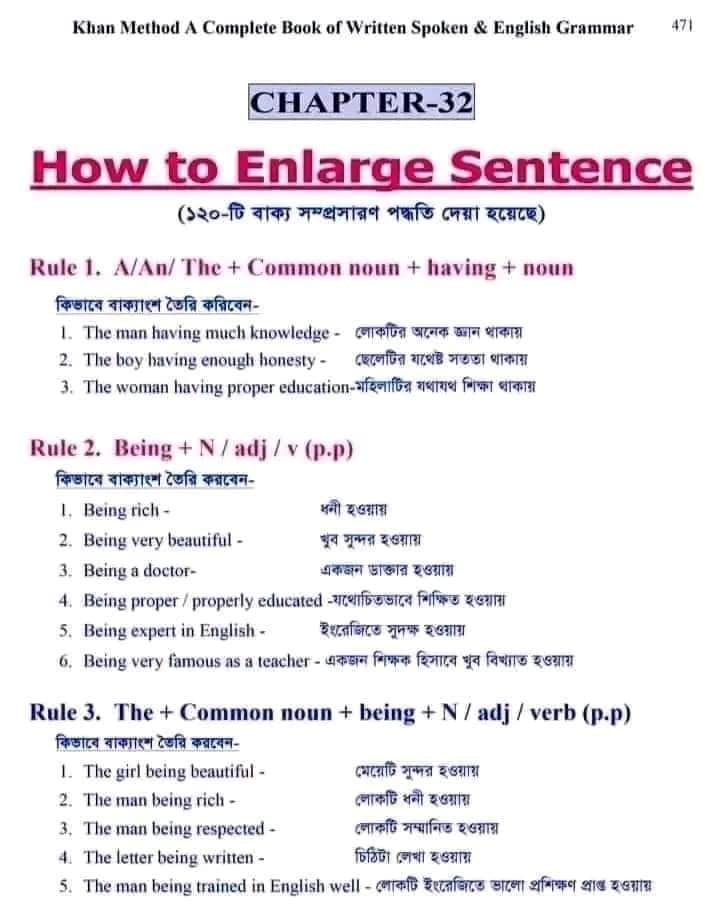

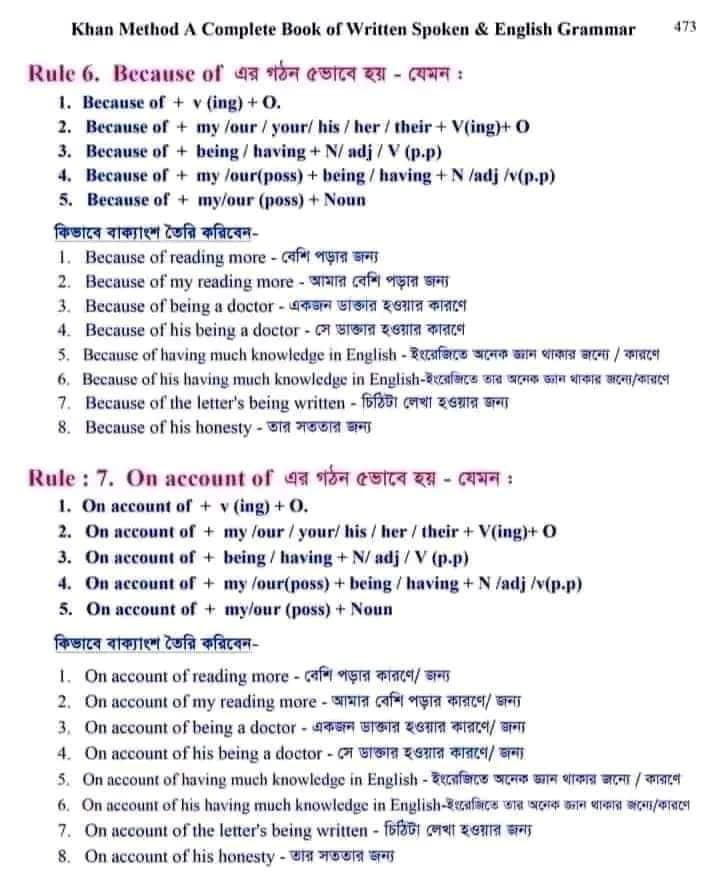
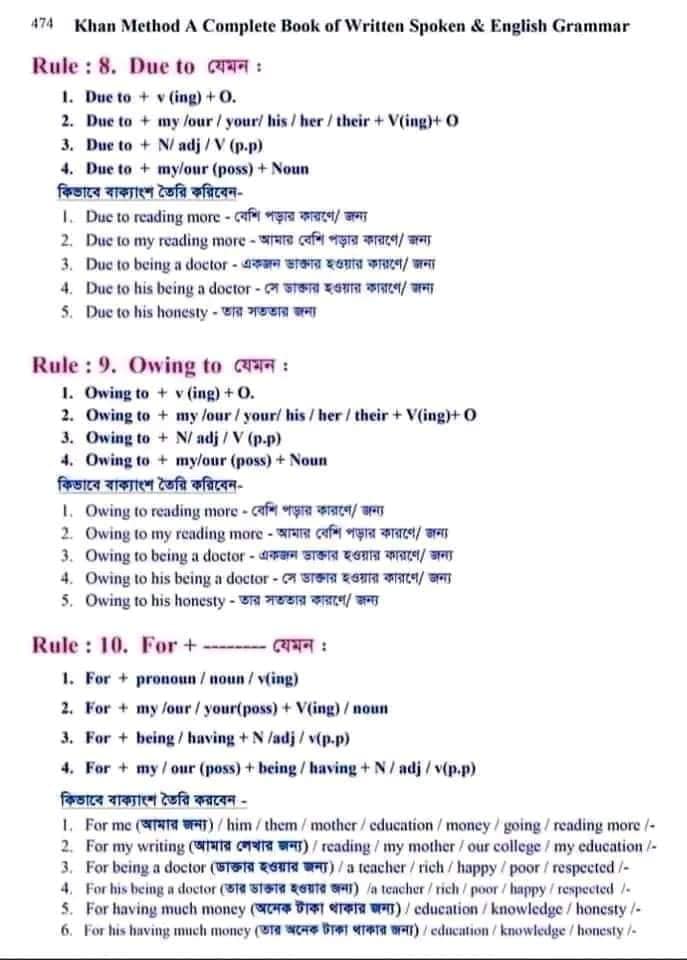
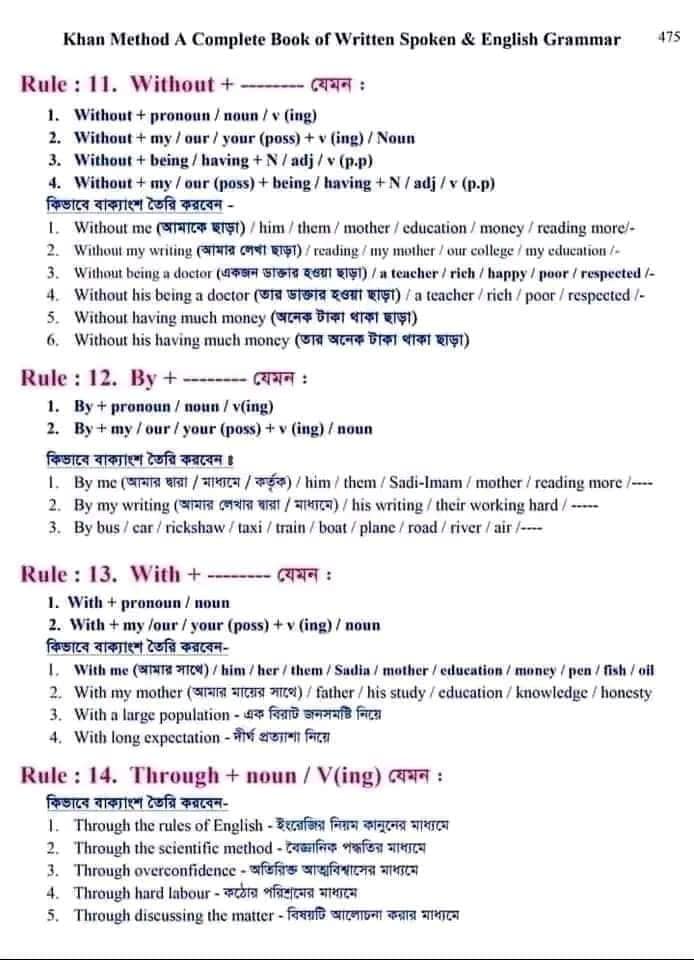
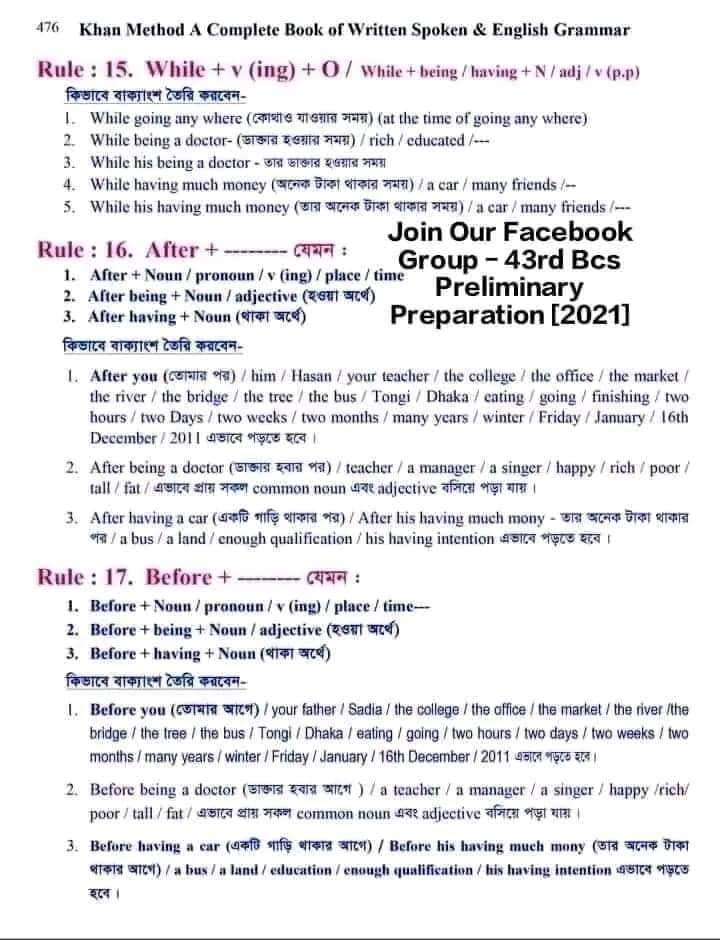
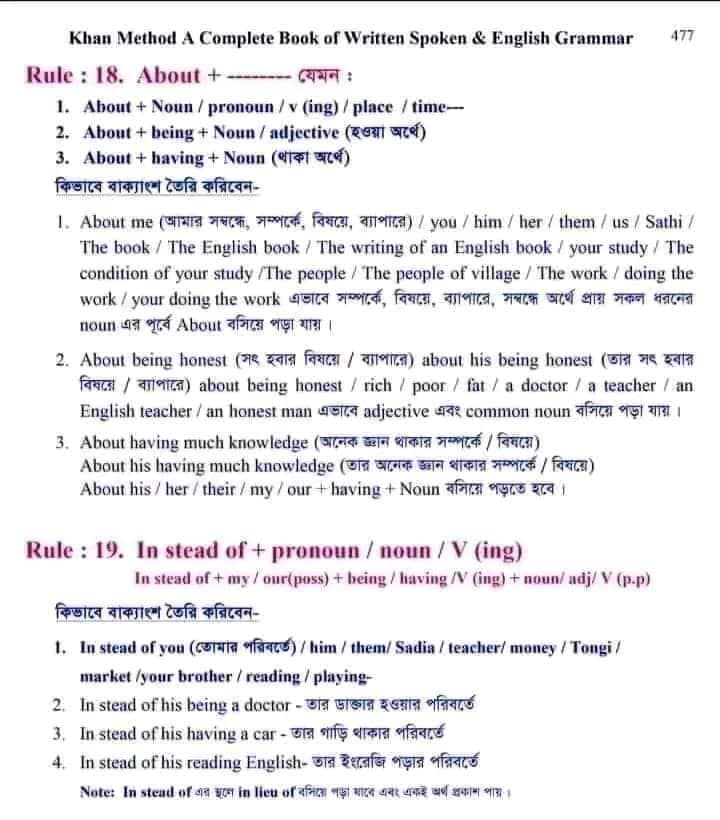
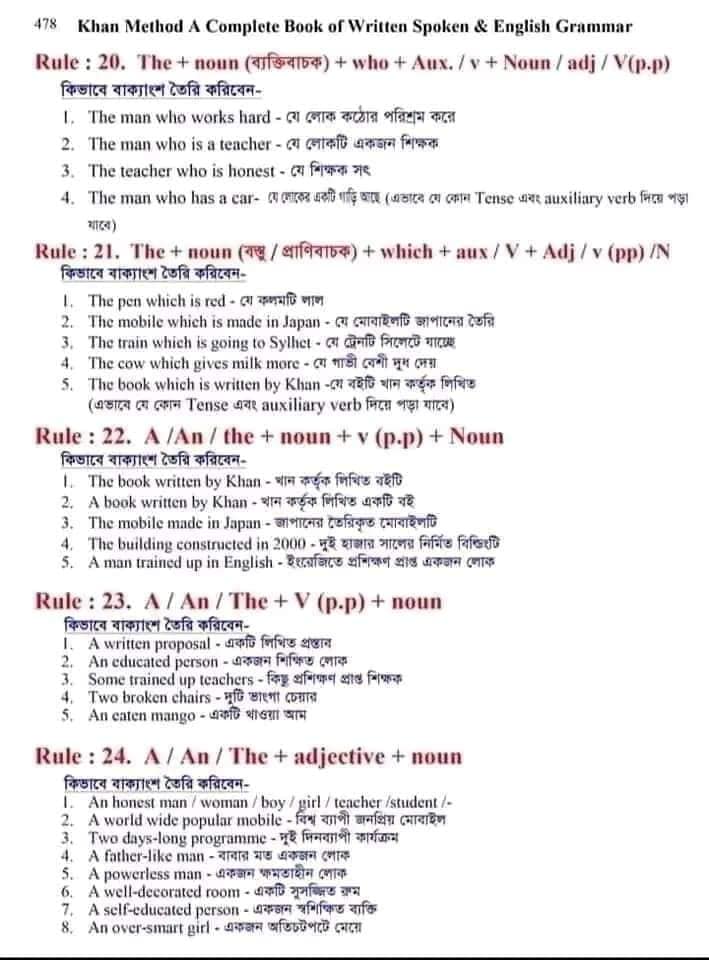
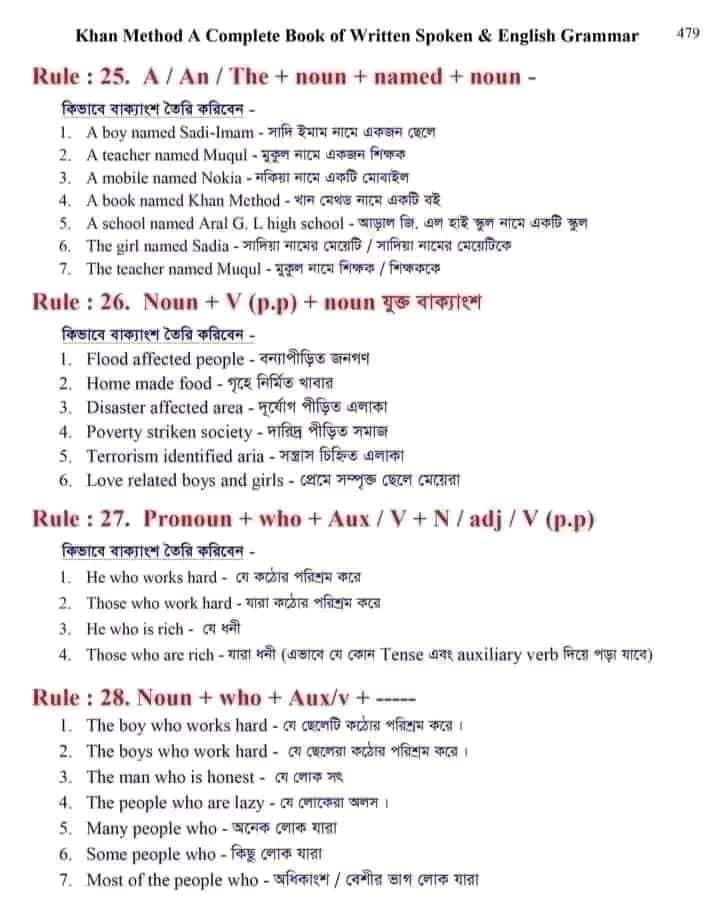
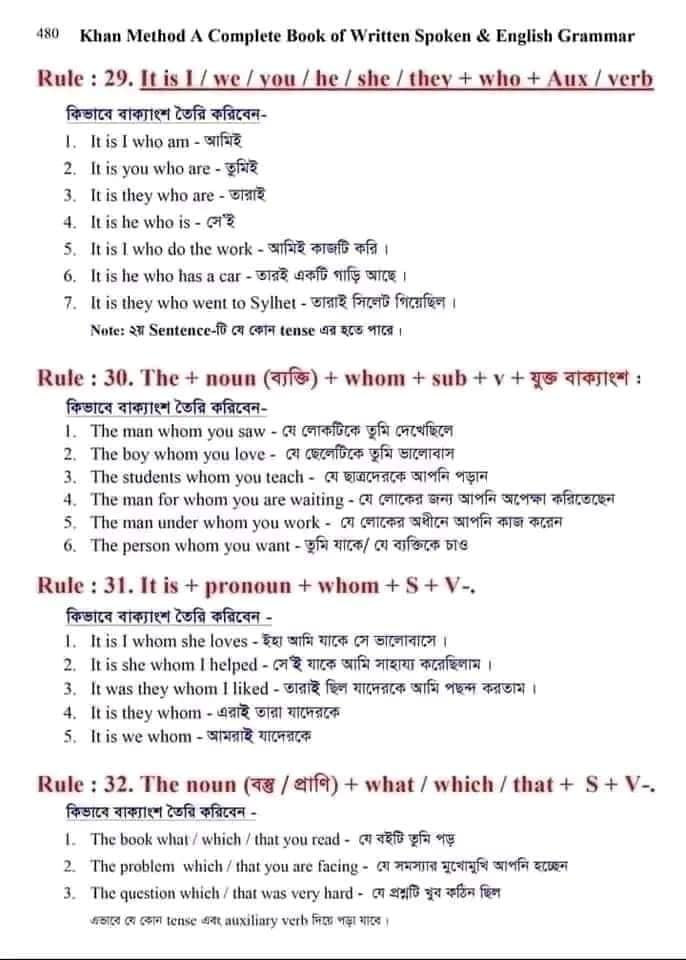


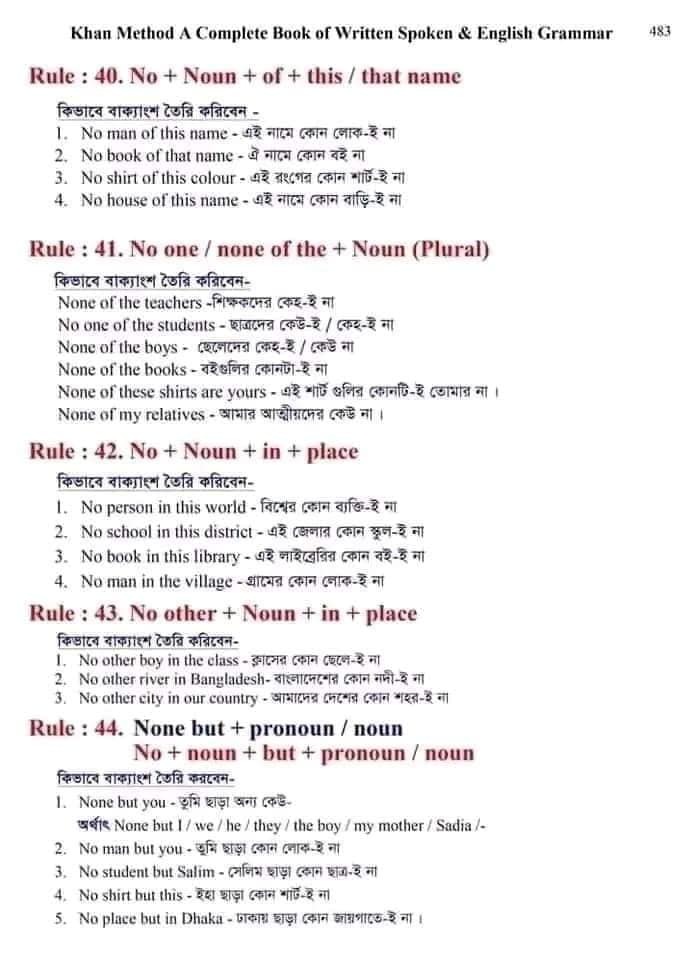
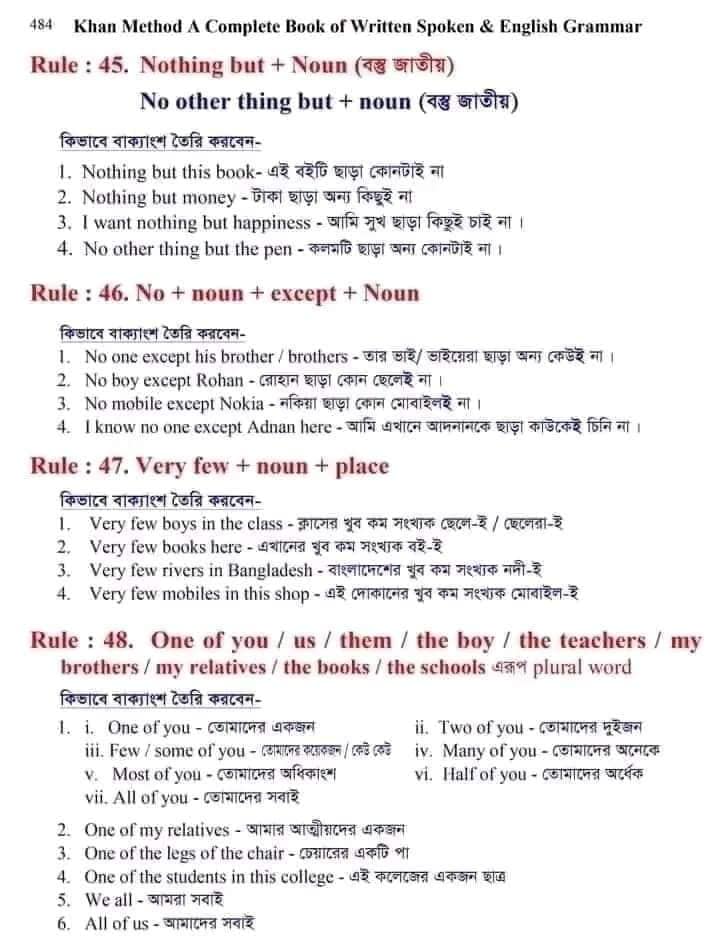
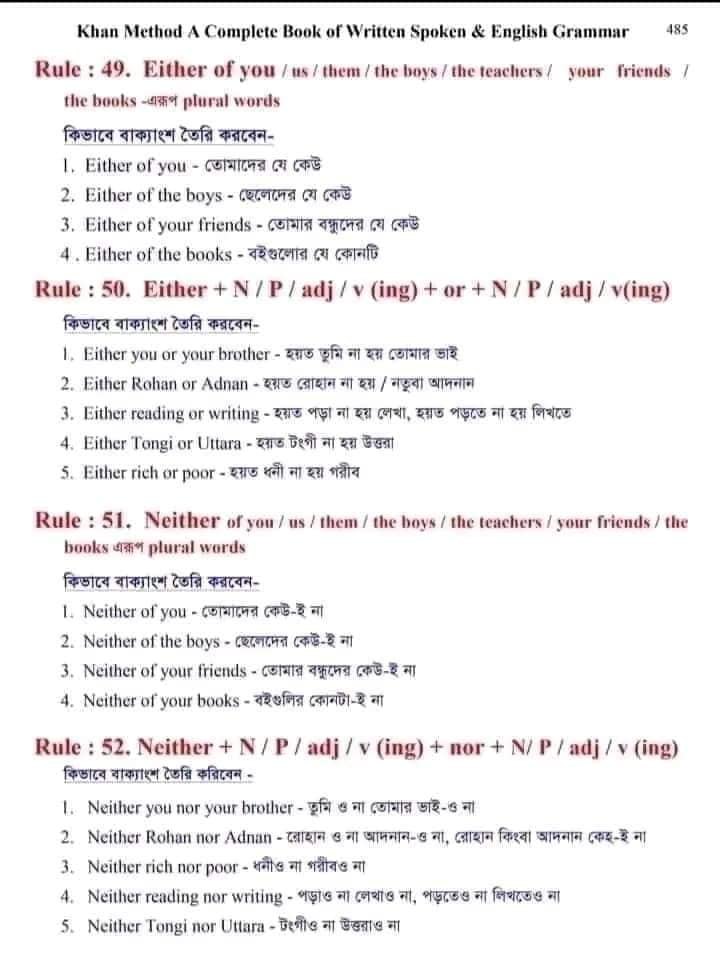
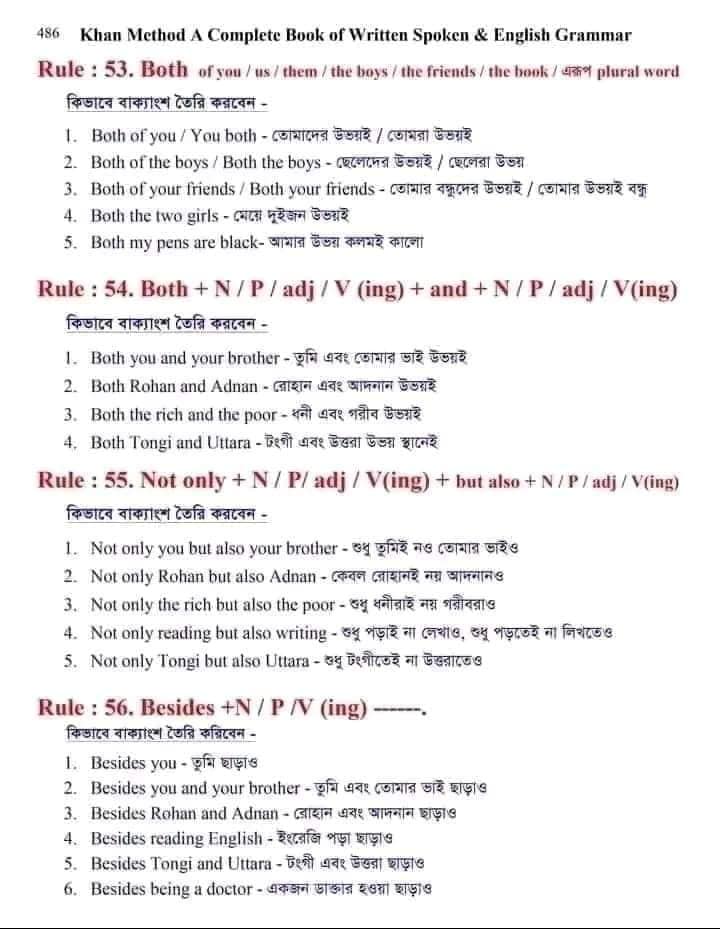
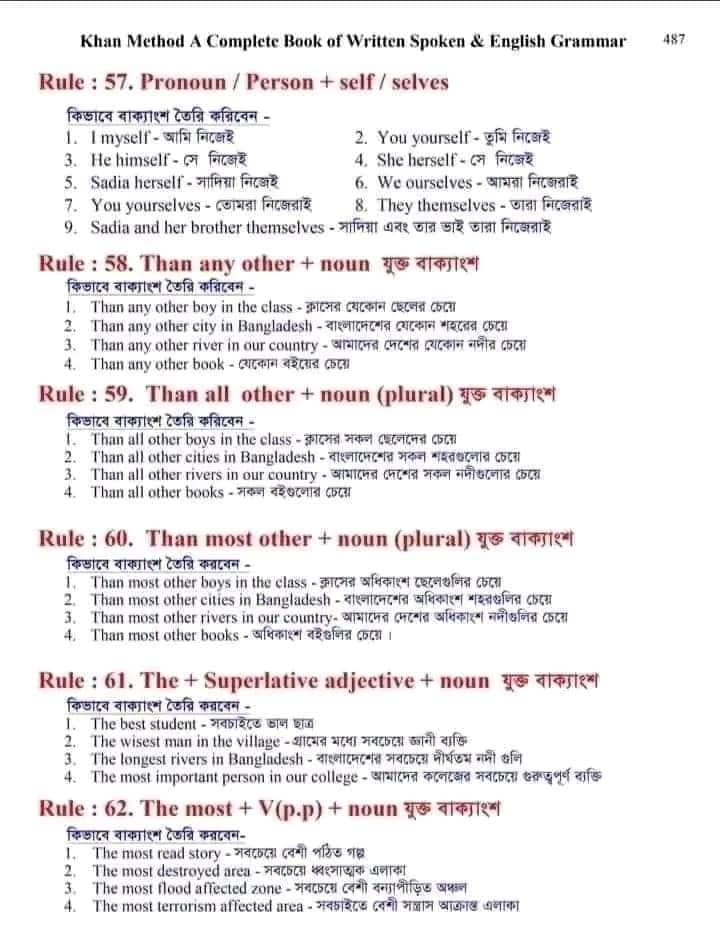
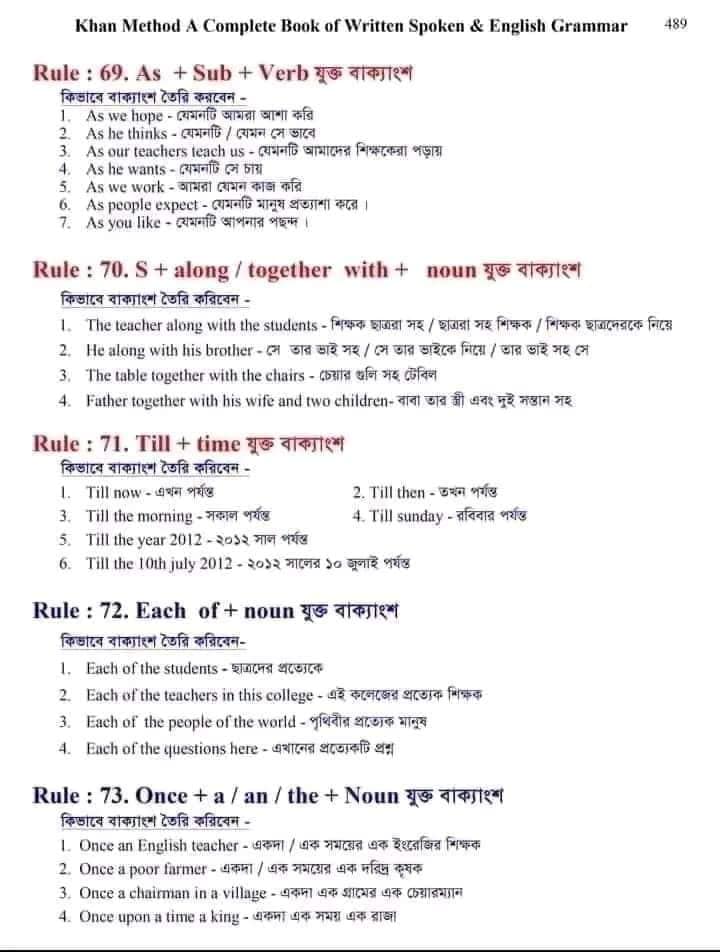







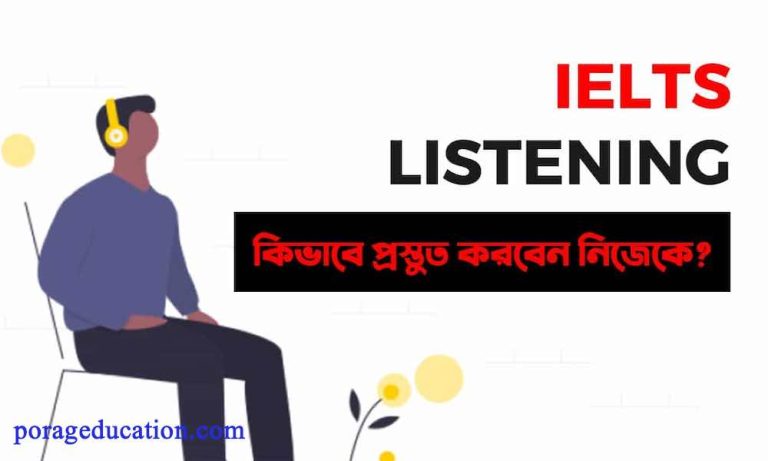
![005.2 [Topics Based] Vocabulary and Phrase-idioms for IELTS & Sentence Making (Speaking & Writing)](https://asraful.bdbookstore.com/wp-content/uploads/2023/10/Screenshot-03-23-2024-01.58.35-768x439.jpg)